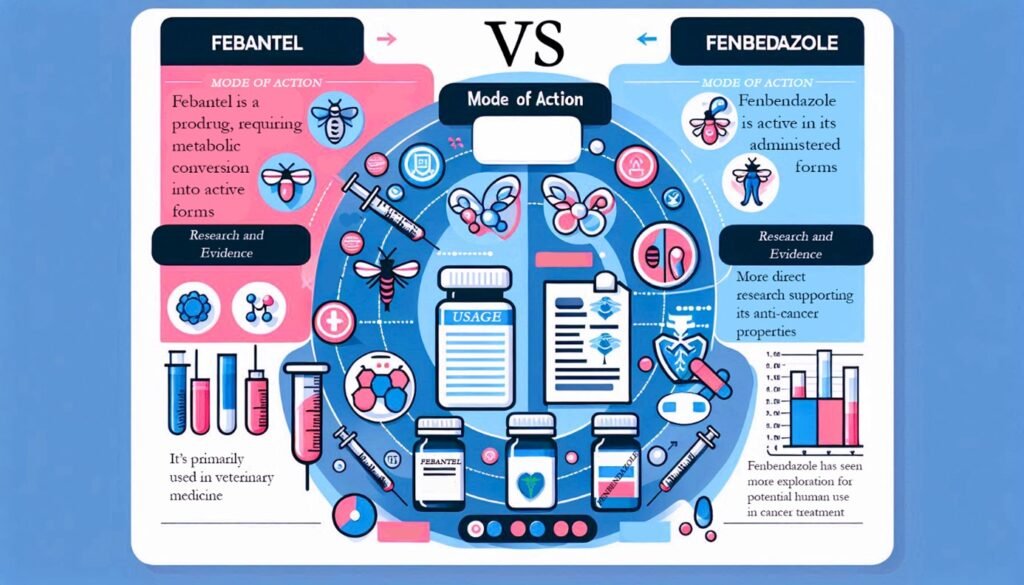Febantel vs Fenbendazole: A Comparative Analysis for Potential Cancer Treatments
In the ongoing search for effective cancer treatments, unconventional medications are garnering attention. Febantel and Fenbendazole, both used traditionally as antiparasitic drugs, are among the potential candidates being studied. This article delves into their uses, efficacy, and potential as cancer treatments, providing a detailed comparison to enhance our understanding of these drugs.
What Are Febantel and Fenbendazole?
Febantel and Fenbendazole are both anthelmintic medications used to treat parasitic infections. They belong to the benzimidazole class of drugs, known for their ability to combat a wide range of parasites, including liver flukes.
Febantel
Febantel is primarily used in veterinary medicine to treat gastrointestinal parasites. It is a prodrug, meaning it is metabolized into its active form within the body, converting into fenbendazole and oxfendazole. This conversion enhances its anthelmintic efficacy against parasites such as liver flukes, roundworms, and tapeworms.
Fenbendazole
Fenbendazole is also an anthelmintic drug used mainly in veterinary contexts. It works by disrupting the energy metabolism of parasites, leading to their death. Like Febantel, it is effective against a range of parasites, including liver flukes and roundworms.
Anthelmintic Efficacy and Cancer
Recent research has explored the potential of both Febantel and Fenbendazole as anti-cancer agents. Their anthelmintic properties suggest they may also inhibit cancer cell growth and proliferation.
Febantel’s Potential in Cancer Treatment
While Febantel itself is less studied in cancer treatment, its metabolites, fenbendazole and oxfendazole, have shown promise. These metabolites are believed to induce apoptosis (programmed cell death) in cancer cells and may interfere with their glucose metabolism. This dual action could potentially inhibit cancer cell growth and proliferation.
Fenbendazole’s Anti-Cancer Properties
Fenbendazole has garnered significant attention for its potential anti-cancer effects. Studies suggest that fenbendazole can disrupt microtubule formation in cancer cells, essential for their division and proliferation. Additionally, it may inhibit glucose uptake in cancer cells, starving them of energy and leading to their death. This dual mechanism of action makes fenbendazole a compelling candidate for further cancer research.
Comparing Febantel and Fenbendazole
While Febantel and Fenbendazole share similar properties and mechanisms, they have distinct differences:
- Mode of Action: Febantel is a prodrug, requiring metabolic conversion into active forms (fenbendazole and oxfendazole), whereas fenbendazole is active in its administered form.
- Research and Evidence: Fenbendazole has more direct research supporting its anti-cancer properties compared to Febantel. However, the metabolites of Febantel (including fenbendazole) have shown promising anti-cancer potential.
- Usage: Both drugs are primarily used in veterinary medicine, but fenbendazole has seen more exploration for potential human use in cancer treatment.

Safety and Side Effects
Both Febantel and Fenbendazole are generally well-tolerated, but they come with potential side effects:
- Febantel: Commonly used in animals, Febantel’s safety profile in humans is less established. Potential side effects may include gastrointestinal disturbances and liver enzyme alterations.
- Fenbendazole: Generally considered safe in animals, fenbendazole’s side effects in humans are still being studied. Known side effects in veterinary contexts include gastrointestinal issues and potential liver enzyme alterations.
Conclusion
Febantel and Fenbendazole represent promising avenues in the exploration of non-traditional cancer treatments. While fenbendazole has more direct research and anecdotal support for its potential anti-cancer effects, Febantel’s metabolites, including fenbendazole itself, show significant promise.
As research continues, these drugs may offer new hope for cancer patients seeking alternative therapies. However, it is crucial to consult healthcare professionals before considering any off-label use of these medications for cancer treatment.
References
- Rios, J. A., et al. (2020). Fenbendazole: A potential anti-cancer agent. Journal of Veterinary Science, 21(5), e74.
- Gupta, S. C., & Prasad, S. (2020). Potential of albendazole as an anti-cancer agent. Journal of Cancer Research and Therapeutics, 16(4), 587-592.
Pantziarka, P., et al. (2014). Repurposing drugs in oncology (ReDO)—mebendazole as an anti-cancer agent. Ecancermedicalscience, 8, 443.

